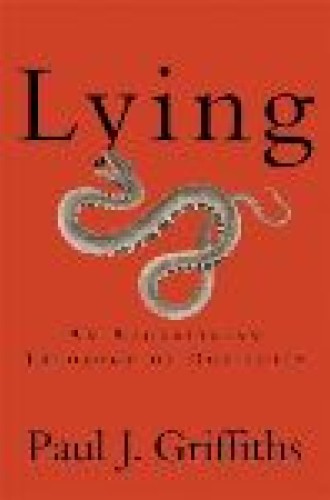Lying: An Augustinian Theology of Duplicity
People who hate getting caught in lies should steer clear of any serious engagement with Christianity. If they happen to be Americans, this should not prove difficult.
These are among the startling implications of Paul J. Griffiths’s demanding book. The claim that animates Griffiths’s work is that “our elevation of the virtue of politeness and courtesy over that of passionate and pointed argument suggests that we don’t think our disagreements very important.” But Griffiths, who holds the Schmitt Chair of Catholic Studies at the University of Illionois, Chicago, thinks our disagreements are very important indeed, and he is not afraid to act on that conviction. (See, for example his and Stanley Hauerwas’s spirited review in First Things [October 2003] of Just War Against Terror, Jean Bethke Elshtain’s defense of “the war on terrorism.”
Griffiths elucidates and commends St. Augustine’s notoriously rigorous position on lying. For Augustine, to lie is to speak contra mentem, against the mind—to say one thing while thinking another. This “duplicitous” use of language is, as Griffiths puts it, the evil proper to lying. This duplicity contradicts the very being of creatures made in the image of the Trinity. According to Augustine, human beings exist always as creatures—that is, as beings whose existence is sheer gift, made possible solely by their participation in God, the source of all being. Creatures sin when they ignore this fundamental distinction between Creator and creation by loving themselves or other parts of creation in ways only God should be loved. Sin is literally incoherent activity and can never be commended. In sinning, creatures act in ways that contradict the very basis of their existence.
Crucial to thinking about lying, then, is considering the proper relationship between thought and speech. Griffiths shows that lying threatens to make that relation a matter of the individual will—people who lie have decided not to have their spoken self-presentation correspond with what they actually think. But Christian doctrine holds that human beings are created in the image of the Trinity—the God whose identity is revealed in the Word spoken by the power of the Spirit in the man Jesus Christ. Thus, according to Augustine’s theological metaphysics, as Griffiths interprets them, contemplating the legitimacy of duplicity is tantamount to contemplating the dissolution of Christian theology: it is entertaining the possibility that words might legitimately conceal rather than reveal identity.
For Augustine, then, the problem of lying is necessarily a theological problem. The modern tendency to isolate “ethics” from “theology,” as if “ethical” problems could be identified and addressed in disconnection from questions about God, is profoundly un-Augustinian. Griffiths illustrates how various famous examples of thinking about lying—in the thought of Plato, Aristotle, Chrysostom, Jerome, Cassian, Aquinas, Kant, Newman and Nietzsche—all fall short in light of Augustine’s robust trinitarianism and its close relation to an “exceptionless ban” on lying.
Griffiths concludes by imagining what kind of community would be necessary if Augustine’s view were to be taken seriously. The use of the subjunctive is intentional—Griffiths thinks such a community does not currently exist. We who inhabit “late-capitalist” cultures and thus are shaped by consumerist economic arrangements are likely to be possessed by particularly pernicious falsehoods. We are likely to live as if the ideal human being were an autonomous owner—precisely the kind of human being whose way of life depends upon a rejection of the Creator-creature distinction. Serious contact with Christianity would necessarily unmask the falsehoods that attend this consumptive mode of being. Such myths could then be repeated only in awareness of their falsity. They could be spoken only as lies. Griffiths’s eloquent reflections ultimately suggest that we must risk living in communities more serious than any we now know if our hope of living in the truth is to be more than wishful thinking.





